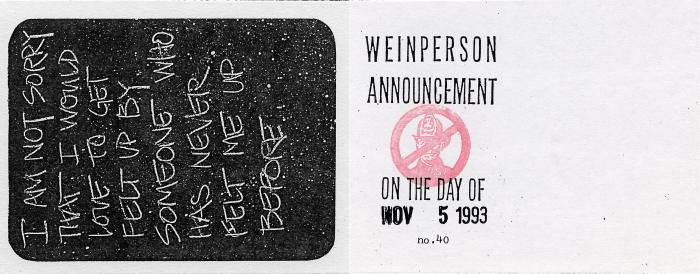[An image of white paper. The center right of the image shows the announcement card for no. 40 in the Weinperson series on Nov 5, 1993 with a person wearing a fire hat surrounded by a circle and slash through the center diagonally. The left of the composition depicts a black rectangle with white splatters and handwriting that reads "I AM NOT SORRY THAT I WOULD LOVE TO GET FELT UP BY SOMEONE WHO HAS NEVER FELT ME UP BEFORE".]
Judith Braun
Weinpersonally Yours #40 , 1993 – 1994
Artwork Type: Prints
Dimensions: 4 x 5 ½ in. (10.80 x 13.97 cm)
Accession #: 20122426.40
Department: Alumni Collection
Credit: Collection of University Art Museum, University at Albany, State University of New York on behalf of The University at Albany Foundation, gift of Corinna Ripps Schaming
Related Exhibitions:
Affinities and Outliers: Highlights from the University at Albany Fine Art Collections
History Lessons
Copyright: © Judith Braun
Object Label:
Show Object Label(s)Having begun her career as an
accomplished realist painter, elements
of text and language became essential
to Judith Braun a.k.a Weinperson’s (b.
1947, American) later work. Deploying
activist strategies of widely distributed
print media and use of slogans,
Braun created a series of fifty-two
announcement cards that she mailed
weekly to her friends and colleagues.
One side of each postcard is treated with
provocatively captioned black-and-white
images, while the other displays text
that includes her newly adopted name
Weinperson—that she, “in a wry gesture
of political correctness,” changed from
her married name Weinman, on the
other. In this familiar, immediate space
of a postcard, Braun addresses social
constructions of identity, power, and
sexuality.
–Affinities and Outliers: Highlights from the University at Albany Fine Art Collections
Judith Braun, a.k.a, Judith Weinperson, created a series of fifty-two announcement cards that she mailed weekly to her friends and colleagues. One side of each colored-stock paper postcard is treated with provocatively captioned images, while the other displays text that includes the adopted name Weinperson—that she, “in a wry gesture of political correctness,” changed from her married name Weinman. In the familiar, immediate space of a postcard, Braun addresses social constructions of identity, power, and sexuality. Postcard and mail artworks have been made and distributed by a number of feminist artists, like Eleanor Antin (b. 1935) and conceptual artists, such as the group FLUXUS (founded 1960), as an alternative to the way ideas and power are circulated in the traditional gallery system. The subversive use of the photocopier, originally intended for corporate purposes, allows Weinperson to create gritty, degraded images, intentionally playing with their legibility.
–History Lessons
Please contact us at dabbatiello@albany.edu to verify collection holdings and artwork information. If you are interested in receiving a high resolution image of an artwork for educational, scholarly, or publication purposes, please contact us at dabbatiello@albany.edu.
